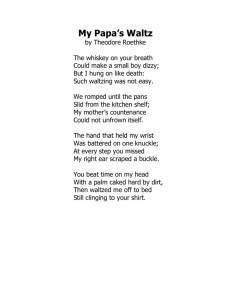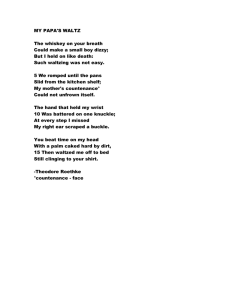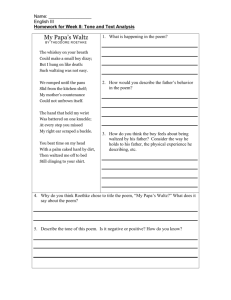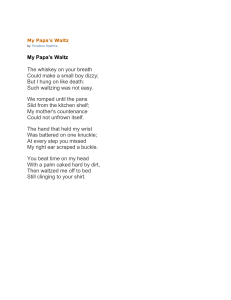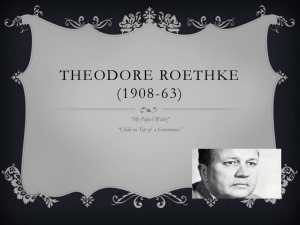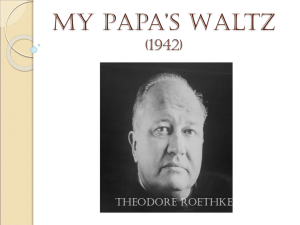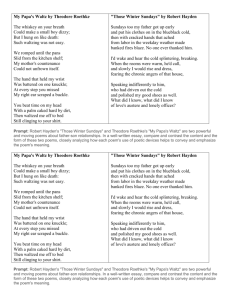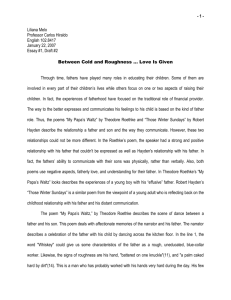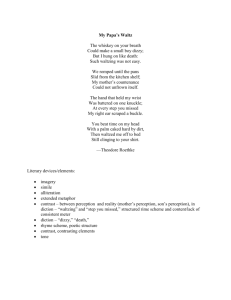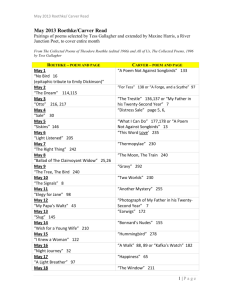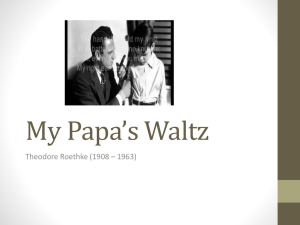Poetry analysis: My Papa's Waltz, by Theodore Roethke
advertisement
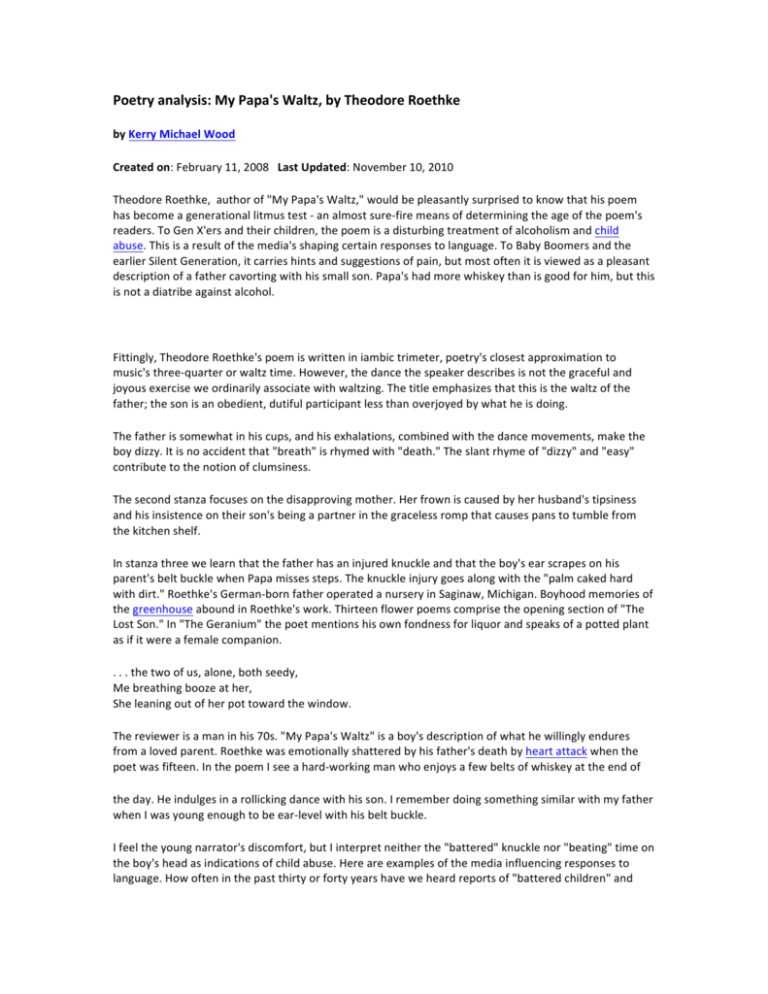
Poetry analysis: My Papa's Waltz, by Theodore Roethke by Kerry Michael Wood Created on: February 11, 2008 Last Updated: November 10, 2010 Theodore Roethke, author of "My Papa's Waltz," would be pleasantly surprised to know that his poem has become a generational litmus test -­‐ an almost sure-­‐fire means of determining the age of the poem's readers. To Gen X'ers and their children, the poem is a disturbing treatment of alcoholism and child abuse. This is a result of the media's shaping certain responses to language. To Baby Boomers and the earlier Silent Generation, it carries hints and suggestions of pain, but most often it is viewed as a pleasant description of a father cavorting with his small son. Papa's had more whiskey than is good for him, but this is not a diatribe against alcohol. Fittingly, Theodore Roethke's poem is written in iambic trimeter, poetry's closest approximation to music's three-­‐quarter or waltz time. However, the dance the speaker describes is not the graceful and joyous exercise we ordinarily associate with waltzing. The title emphasizes that this is the waltz of the father; the son is an obedient, dutiful participant less than overjoyed by what he is doing. The father is somewhat in his cups, and his exhalations, combined with the dance movements, make the boy dizzy. It is no accident that "breath" is rhymed with "death." The slant rhyme of "dizzy" and "easy" contribute to the notion of clumsiness. The second stanza focuses on the disapproving mother. Her frown is caused by her husband's tipsiness and his insistence on their son's being a partner in the graceless romp that causes pans to tumble from the kitchen shelf. In stanza three we learn that the father has an injured knuckle and that the boy's ear scrapes on his parent's belt buckle when Papa misses steps. The knuckle injury goes along with the "palm caked hard with dirt." Roethke's German-­‐born father operated a nursery in Saginaw, Michigan. Boyhood memories of the greenhouse abound in Roethke's work. Thirteen flower poems comprise the opening section of "The Lost Son." In "The Geranium" the poet mentions his own fondness for liquor and speaks of a potted plant as if it were a female companion. . . . the two of us, alone, both seedy, Me breathing booze at her, She leaning out of her pot toward the window. The reviewer is a man in his 70s. "My Papa's Waltz" is a boy's description of what he willingly endures from a loved parent. Roethke was emotionally shattered by his father's death by heart attack when the poet was fifteen. In the poem I see a hard-­‐working man who enjoys a few belts of whiskey at the end of the day. He indulges in a rollicking dance with his son. I remember doing something similar with my father when I was young enough to be ear-­‐level with his belt buckle. I feel the young narrator's discomfort, but I interpret neither the "battered" knuckle nor "beating" time on the boy's head as indications of child abuse. Here are examples of the media influencing responses to language. How often in the past thirty or forty years have we heard reports of "battered children" and "battered wives," "child abuse"? Knuckles do suffer if one labors with tools in a greenhouse. One need not physically abuse one's children to get a skinned knuckle. The same phenomenon has occurred with the words "beater" and "beats." People aged 50 and below hear a different meaning than do their elders. When speaking of music, one "beats time." No other verb works. The belt buckle scraping the son's ear means not that the father whips the boy. It merely objectifies the height difference of father and son. Thus these four simple quatrains say opposite things to readers of different age groups. Terms like child-­‐ abuse and "battered" family members fall easily from the tongue today since we hear them so often. Such was not the case when the poem was being written. The mother who only frowns and does not attempt to halt the dance or protest her husband's alcohol consumption would today be spoken of as "codependent" or an "enabler." In 1948 when the poem was written, those sociological terms did not exist. America in 1948 was a Norman Rockwell nation. Kitchens were the centers of family life. Mothers most often were not members of the work force. Working-­‐class fathers downed whiskey, not wine, to relax from the day's labor. "Dysfunctional" was not yet a term to describe families or relationships. A son wouldn't be glued to computer games or TV but would be available for a gambol about the kitchen with his father. Things change. Not until the mid 1960s did the wine industry begin to burgeon. Prior to that time, few could define the word sommelier. Italian Swiss Colony was available to those unable to afford scotch, bourbon, gin or vodka. These days I know only a few people who drink any alcohol other than wine or beer at cocktail parties and open houses. Are we as a society becoming more sober and sensible? If so, why is it that no one dares hitchhike anymore? Why do mothers who in their youth walked or rode their bikes to grade school and high school feel it necessary to accompany their children to the bus stop or drive them to school? When did terms like "teacher abuse," "sexual offender," and "kiddy porn" become catchwords? Has our society become more dangerous? The conflicting interpretations of this relatively straightforward poem speak volumes about changes in American society. I sense an amused smile from the inhabitant of Theodore Roethke's coffin. http://www.helium.com/items/854437-­‐poetry-­‐analysis-­‐my-­‐papas-­‐waltz-­‐by-­‐theodore-­‐roethke

